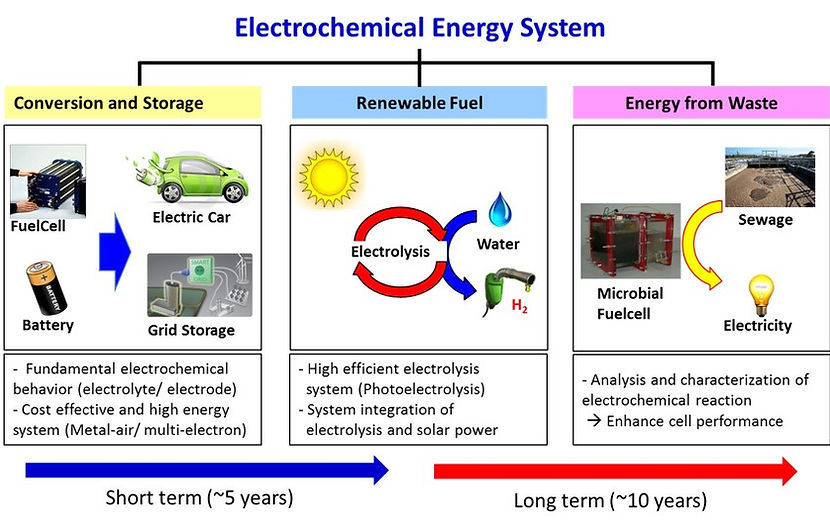
Our lab is conducting fundamental research for electrochemical and thermal energy systems to understand electrochemical mechanism and key parameters to resolve the challenging issues of the conventional systems such as low performance, high system cost, and safety concern. Detailed topics in the research are as follows:
1. Electrochemical energy system
High performing system can be devised from complete understanding of physico-electro-chemical behaviors of reactant flow in the operating cell. Micro-fluidic behavior of aqueous (non-aqueous) reactants in carbon porous electrode is being investigated to understand the effect of porous structure and its surface properties on the transport of micro-fluid stream. And also, we are studying the electrochemical behavior or effect of electrolyte/additives to tune the cell potential and to control side reactions. Oxygen-reduction reaction on carbon material is under investigation, and various functional groups are applied on the carbon through thermal, chemical, and electrochemical methods to control/ enhance the reaction on carbon. To enhance the energy density or reduce system cost, new and promising systems are being investigated such as multi-electron reactants, membrane-less structures, and metal-air systems.
As the below figure illustrates, we are performing cutting-edge research to advance knowledge in the electrochemical systems including energy storage and conversion system (batteries and fuel cells), generation of renewable fuel (electrolysis), and energy from waste (microbial fuel cell).

2. Advanced Thermal Energy System
Need for highly performing cooling techniques is increasing as small and compact-size electronic devices are increasing the number in application and advanced high-energy manufacturing systems are being developed actively. One of the promising cooling techniques is to use of advanced coolant called nanofluids which are suspension of nanoparticles with diameters less than 100 nm in liquid, and the nanofluids have attracted intense attention due to their remarkable thermal properties, and they have been considered for many applications from waste heat removal from a nuclear reactor to medical application in cancer therapy. Moreover, recent studies reported that the addition of nano particles to conventional working fluids can improve collection of solar heat energy.
However, the full application of the nanofluids could not be achieved due to challenging issues of durability (i.e. stability) and cost. Our lab is focusing on understanding physics and mechanism of stability of emulsion-state solution, and finding key parameters to control Vander Waals attractive forces and electrostatic repulsive forces. Surface properties of nanoparticles (i.e. charge density (zeta-potential) and geometry) and particles size are being investigated on their effect on the stability of nanofluids. And to understand further the interactions among particles/ solvent/ surfactant (i.e. stabilizer), the stability is being tested in various pH conditions for various nanoparticles and surfactants.

3. Research sponsors






